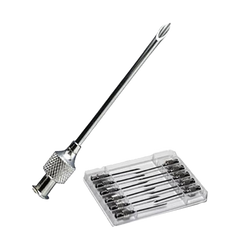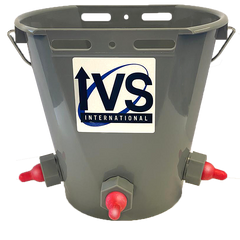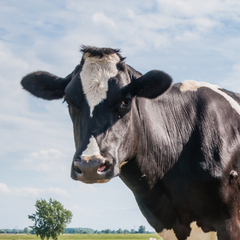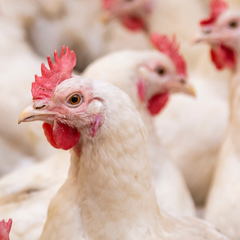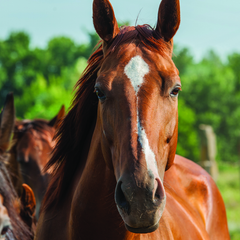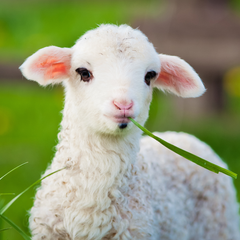Popular Categories
Fees products
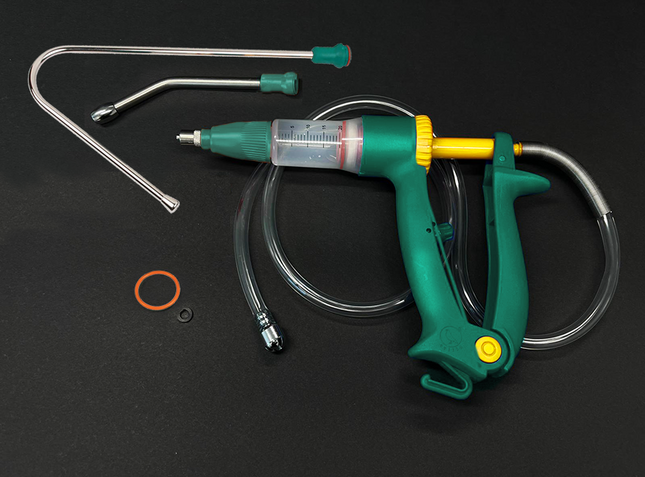
30CC / 50CC Cattle Drencher Gun Kit
3-in-1 Drencher for Dairy Cows, Beef Cattle, and Goats. This kit has it all! Hook Cannula, Mid-size Cannula, and Luer Lock for use as a vaccinator as well. Backpack adaptor.Drench Gun is perfect for use with Panacur suspensions and other oral medicines as well as any vaccines. Ergonomic design for maximum user comfort and durability. Dose adjuster from 30 ml to 50 ml for easy dose setting and accuracy. Pistol grip drench gun allows ease of administration of fluids to livestock, including cattle, sheep, and goats. Durable plastic frame with curved metal drenching probe.Special hook cannula aids in easy administration of oral suspension when dosing multiple herd animals.
$44.90 - $48.99
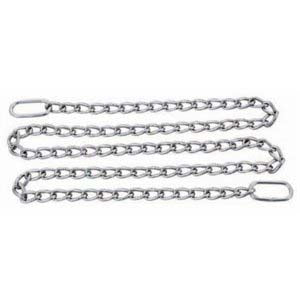
30˝ Chaîne OB
The 30' OB Chain is an essential tool in the realm of veterinary obstetrics, particularly in the agricultural sector. Crafted from high-grade materials this durable chain is designed to withstand the rigors of assisting with the delivery of calves. Its length and material are chosen to provide a good grip on the calf without causing injury, ensuring the safety of both the animal and the user. The OB chain's sanitary properties make it a superior choice over traditional ropes, which can harbor bacteria and are more challenging to clean. The choice of chain length is crucial; the 30' chain is optimal when the front legs of the calf are exposed, while longer chains may be necessary for different birthing positions within the birth canal. This tool's design reflects a deep understanding of the calving process and a commitment to animal welfare, making it a reliable choice for farmers and veterinarians alike. During calf delivery, there are several common complications that can arise, posing risks to both the calf and the mother. One of the most frequent issues is dystocia, which is difficulty in delivering the calf due to its size or position. Calves that are too large or positioned abnormally in the birth canal can cause significant delays in delivery, leading to oxygen deprivation and potential mortality. Additionally, cows with smaller pelvic areas may experience more difficulty during calving, which is particularly common in younger cows that have not reached full skeletal maturity. Nutritional status also plays a critical role; cows that are either undernourished or overweight may have increased rates of dystocia. Other complications include abnormal presentations, such as breech or transverse positions, which require veterinary intervention to correct. Managing these risks involves careful monitoring, proper nutrition, and sometimes, medical intervention to ensure the health and safety of both the cow and the calf during the birthing process This OB Chain is Strong! Tested to withstand a minimum of 1,200 lbs. of pull
$8.75
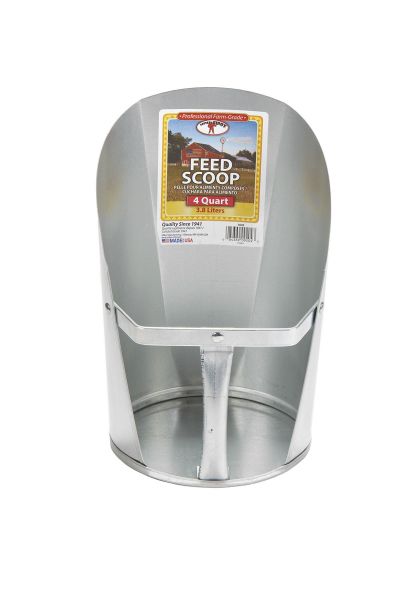
Pelle à fourrage galvanisée de 4 litres
Heavy-gauge galvanized steel scoop with riveted handle. Perfect for scooping grain, but heavy-duty enough for pelleted hay and feeds. Flat end for easy storage. This is the scoop you want if you are looking for long wear and years of service. 6.75 inch long by 7 inch wide by 11.812 inch high, 4-quart capacity. Heavy-gauge galvanized steel Riveted handle Long wearing for years of service Flat end for easy storage 4-quart capacity
$17.34
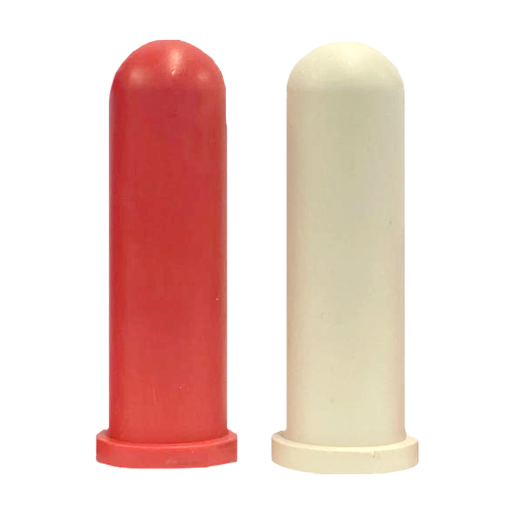
4˝ Tétines de veau
Calf nipples are an essential tool in the husbandry of young livestock, particularly for calves that may be orphaned or require supplemental feeding The quality of these nipples is paramount as they must be durable enough to withstand the vigorous nursing behavior of calves, yet soft enough to be safe for their delicate mouths. Known for its exceptional rubber formula that balances toughness with flexibility for extended use these nipples are designed to fit specific bottle caps and are often available in various sizes to accommodate different age groups and feeding needs. Proper use of calf nipples involves ensuring they are clean and free from defects before each feeding, and replacing them at signs of wear to prevent ingestion of small pieces. With the right quality and care, calf nipples can significantly ease the process of hand-rearing calves, ensuring they receive the vital nutrition they need during the early stages of life. Signs of wear in calf nipples can include visible cracks, tears, or significant thinning of the rubber material. These defects can not only affect the feeding efficiency but also pose a health risk to the calves, as cracked nipples can harbor bacteria that may lead to infections. It's crucial to inspect the nipples regularly for these signs of wear and tear and replace them promptly to maintain a safe and hygienic feeding environment for the young livestock. Additionally, any discoloration or change in texture could indicate degradation of the material, which is another sign that the nipple should be replaced. Proper maintenance and timely replacement of calf nipples are essential for the well-being of the calves and the smooth operation of feeding routines Milk Bucket/Bottle Nipple/Teat Replacement. Non-toxic rubber for milk drinking feeders 4˝ length; Red or White
$3.90 $3.50
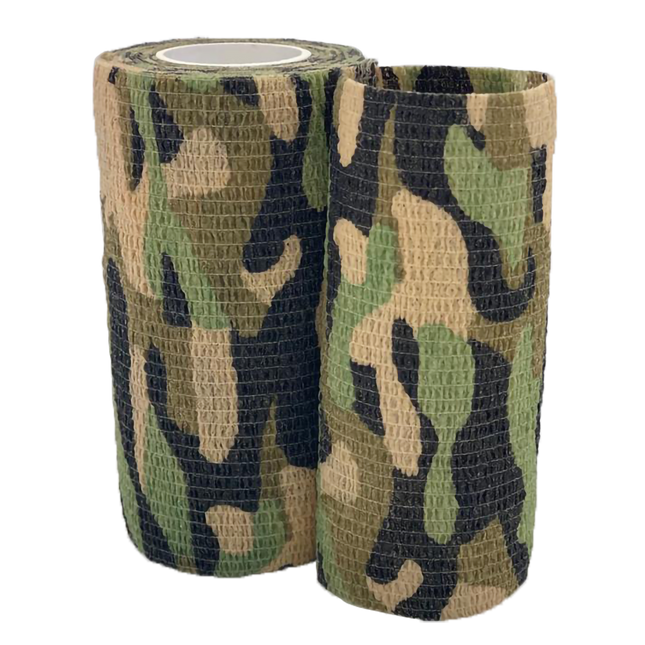
Bandage adhésive de 4", camouflage
Cohesive bandages, particularly those with a 4-inch width and camouflage pattern, are a unique and versatile product that serve a variety of purposes in medical and non-medical settings. These bandages are self-adherent, meaning they stick to themselves without adhering to skin or hair, which makes them an ideal choice for quick and painless application and removal. The quality of these bandages is evident in their material composition—typically a woven fabric coated with latex or synthetic materials that provide both elasticity and breathability. This combination allows the bandage to conform to the body's contours, support without restricting movement, and promote faster healing by letting the skin breathe. The camouflage pattern on these bandages is not just for aesthetic appeal; it serves practical purposes as well. In outdoor activities and military use, the pattern helps blend medical dressing with the environment, which can be crucial in tactical situations. Moreover, the cohesive bandage's compression capabilities make it an excellent tool for managing swelling and improving blood flow to injured areas, thereby aiding in the recovery process. Its ease of use also extends to sports, where it supports muscles and joints, and in veterinary care, where it provides a secure hold without discomfort to animals. In conclusion, the 4-inch cohesive bandage with a camouflage pattern is a testament to the innovation in medical supplies, offering quality, functionality, and versatility. Its design and material science unlock a range of uses, from therapeutic applications to practical solutions in various settings. This cohesive bandage wrap easily adheres to itself but will not stick to other surfaces, such as skin or hair, making it easy to remove. Unlike non-adhesive bandages, the self-adhering bandage wraps do not require clips or pins to stay in place. Ideal for use on pets and livestock, also works great on human ankles, wrists, fingers, toes, elbows and knees! Features• Strong self adhesive — quick & easy application. • Provides lightweight compression and sticks to itself without sticking to the wound. • Allows skin to breathe and is non-irritating. • Each roll is 4˝ x 5 yds of stretchable material. • Sold individually or in boxes of 18.
$1.85 - $33.30
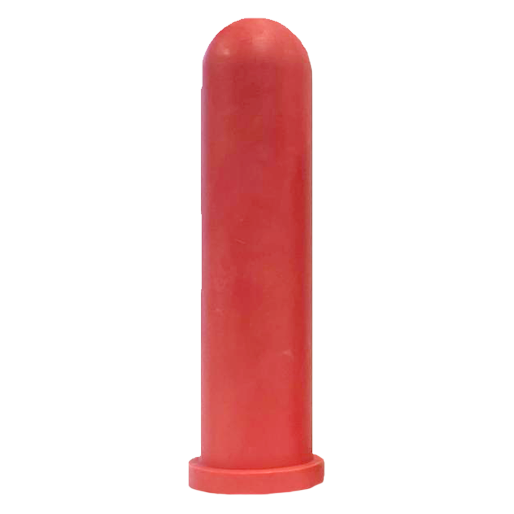
5" CALF NIPPLE
The 5˝ Calf & Lamb Replacement Nipple is a critical component in the hand-rearing of young livestock, ensuring that orphaned or supplemental-fed calves and lambs receive the necessary nutrition in the absence of their mother's milk. These nipples are designed to mimic the natural feeding experience, promoting proper suckling behaviors and digestion. Quality replacement nipples are made from non-toxic, durable materials that can withstand repeated use and cleaning. They are often longer to fit various feeder types and to accommodate the growing size of the animals. The use of high-quality replacement nipples can significantly affect the health and growth rates of young animals, making it essential for farmers and animal caregivers to choose products that are both safe and effective. Innovations in this area, such as no-leak designs and flow-control features, have improved the efficiency of feeding and reduced the risk of digestive issues. When selecting a replacement nipple, it is important to consider the material, size, and design features that best suit the specific needs of the calves or lambs being reare. Common issues with calf and lamb feeding can range from inadequate nutrition to physical health problems. Poor ewe condition, particularly after lambing, can lead to insufficient milk production, affecting the lamb's growth and survival. Malformed teats or infections can hinder nursing, necessitating human intervention for bottle feeding. Calves and lambs are also susceptible to diseases like scours or pneumonia, which can be exacerbated by stress from feeding difficulties. Additionally, improper feeding techniques or unclean equipment can introduce bacteria, leading to digestive disorders. It's crucial to monitor young animals closely for signs of distress, ensure they receive colostrum for immunity, and maintain a clean feeding environment to mitigate these risks Milk Bucket/Bottle Nipple/Teat Replacement. Non-toxic rubber for milk drinking feeders. 5˝ length for any feeder need.
$4.05 - $7.75
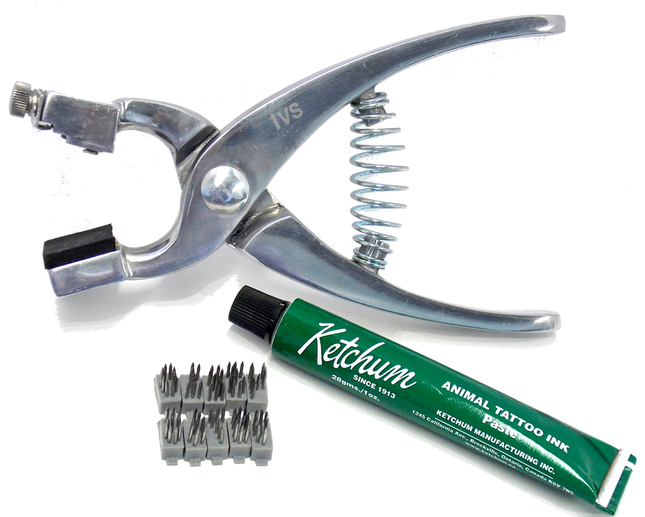
Kit de pince de tatouage standard 5/16" (comprend les chiffres 0-9 et la pâte verte)
The 5/16" Standard Tattoo Plier Kit is an essential tool for livestock management, providing a reliable method for permanent animal identification. Crafted from Strong, lightweight aluminum alloy the plier holds 4 digits and It comes with set of numerals (0-9) and a 1 oz tube of green tattoo paste. The pliers are designed to be lightweight, reducing hand fatigue during extended use, which is crucial for clear and precise tattooing. The ear release feature is a significant advantage, ensuring that the needles disengage cleanly from the ear, preventing smudging and promoting a clear, permanent mark. The kit's ease of use and the quality of the imprint make it a staple in livestock identification, aiding in tracking and record-keeping for herd management. With the addition of nitrile gloves and ink included the tattoo plier kit is a comprehensive solution for the identification needs of sheep, pigs, goats, rabbits, and other livestock. When using a tattoo plier for livestock identification, it's crucial to follow best practices to ensure the markings are clear, permanent, and safe for the animals. Begin by restraining the animal securely, preferably in a squeeze chute, and clean the ear with rubbing alcohol to remove any wax or debris that could affect the tattoo's clarity. It's advisable to clip hair from the tattoo area for better visibility and to prevent interference with the ink. Use a halter for additional control if necessary. When applying the tattoo, make sure the digits are correctly aligned and the pliers are set firmly to ensure the ink penetrates the skin adequately. After tattooing, use a toothbrush or similar tool to rub more ink into the punctures, enhancing the permanence of the mark. Disinfect the equipment between animals to maintain biosecurity measures. Regularly check the tattoos for legibility, as hair growth can cause fading over time. Lastly, prioritize human safety while working around the animals, as proper restraint is essential to prevent injuries.
$39.00
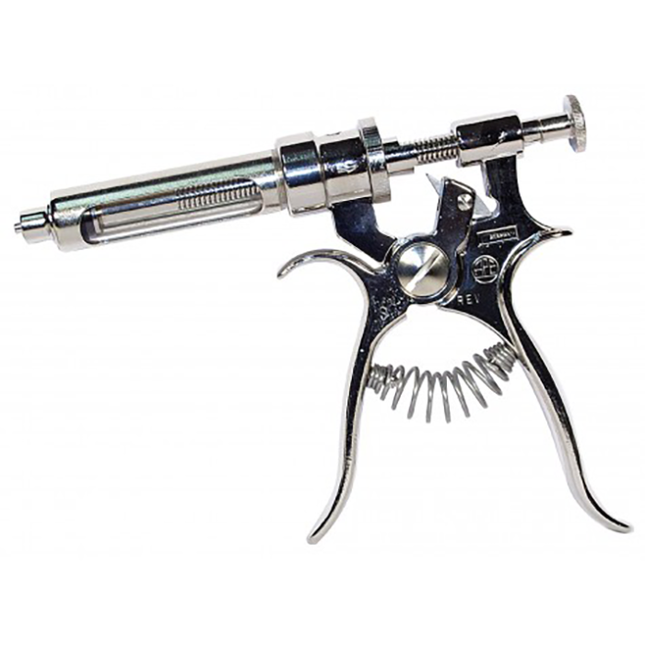
50CC Automatic Metallic Roux Vaccinator device
The 50CC Automatic Metallic Roux Syringe is a high-quality veterinary tool designed for precision and durability. Its chrome metal body and stainless steel plunger ensure a robust construction suitable for repeated use in administering medication to a variety of animals including cattle, swine, sheep, goats, and horses. The syringe features a replaceable glass barrel, contributing to its longevity and ease of sterilization. The dosage is easily adjustable with a simple turn of the dial, allowing for accurate measurements ranging from 1 to 5 mL. This syringe also includes a Luer lock, which is a standardized fitting for securing needles, ensuring a safe and secure connection. The design incorporates reverse threads on the rear handle for self-tightening, which prevents loosening during injections. For those in the veterinary field, the Roux Syringe represents a reliable and efficient tool for the administration of treatments The 50CC Automatic Metallic Roux Syringe is commonly used in veterinary medicine for the administration of various treatments and medications. Its precise dosage adjustments make it ideal for delivering vaccines, antibiotics, or other injectable solutions to large animals such as cattle, swine, sheep, goats, and horses. The syringe's durability and ease of sterilization also allow for its use in field conditions, where it can be repeatedly used for mass treatments or vaccinations during outbreaks of disease. Additionally, its Luer lock tip ensures compatibility with a wide range of needle types, making it a versatile tool for different veterinary procedures ***Due to California state licensing regulations, this product cannot be shipped to California.
$72.80
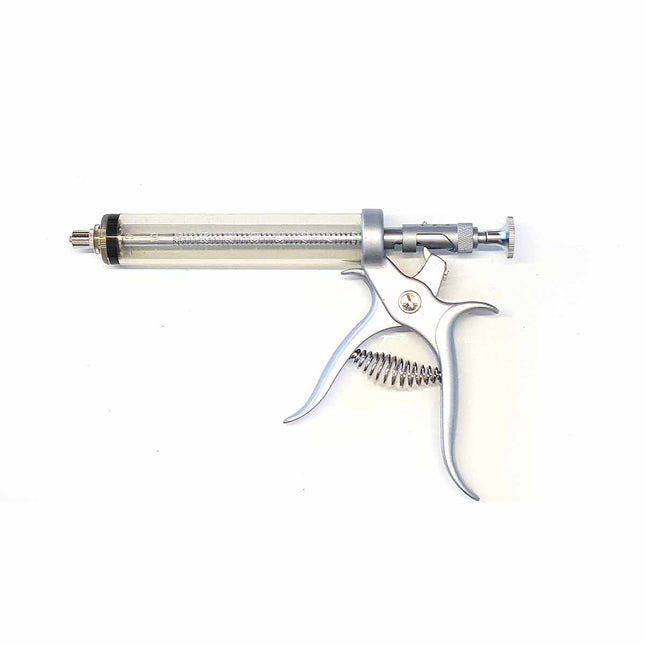
50cc Automatic Metallic Vaccinator
The 50cc automatic metallic syringe is a durable and precise instrument commonly used in veterinary medicine and livestock management. Its robust construction ensures longevity and consistent performance, which is essential for administering medications and vaccines to animals. The syringe's semi-automatic feature allows for repeated injections with a single fill, increasing efficiency and reducing the time needed to treat multiple animals. The adjustable dosage setting provides flexibility and accuracy, ensuring that each animal receives the correct amount of medication. This type of syringe is designed for ease of use and maintenance, with parts that can be easily disassembled for cleaning and sterilization, contributing to safe and hygienic practices. Overall, the 50cc automatic metallic syringe is a valuable tool for professionals in animal health, offering quality, reliability, and precision in various applications. The semi-automatic feature of a 50cc automatic metallic syringe is designed to streamline the process of administering injections, making it more efficient and less time-consuming. This feature typically involves a mechanism that allows the syringe to automatically refill after each injection, readying it for the next dose without the need for manual preparation. While the specific mechanics can vary, it generally works by utilizing a spring-loaded system that, once triggered, draws the medication into the chamber from a vial or reservoir. After administering the dose, the user can reset the syringe with a simple action, such as pulling a lever or pressing a button, which prepares the syringe to deliver the next dose. This semi-automatic system is particularly beneficial when treating a large number of animals, as it reduces the effort required for repeated injections and ensures consistent dosing. Maintaining the semi-automatic feature of a 50cc automatic metallic syringe is crucial for ensuring its longevity and proper functioning. Regular cleaning is essential; after each use, the syringe should be disassembled, and all parts should be thoroughly cleaned and dried to prevent corrosion or medication buildup. It's important to use the appropriate cleaning solutions that are compatible with the syringe materials to avoid damage. Lubrication of moving parts with IVS veterinary-grade lubricant can help maintain smooth operation. Periodically checking for worn or damaged parts and replacing them as needed will keep the syringe in optimal condition. Always refer to the manufacturer's guidelines for specific maintenance recommendations and procedures to ensure that the syringe continues to operate efficiently and safely This Lightweight Syringe comes with luer lock tip and delivers 1cc–5cc accurate, adjustable dosages.
$55.00 $53.00
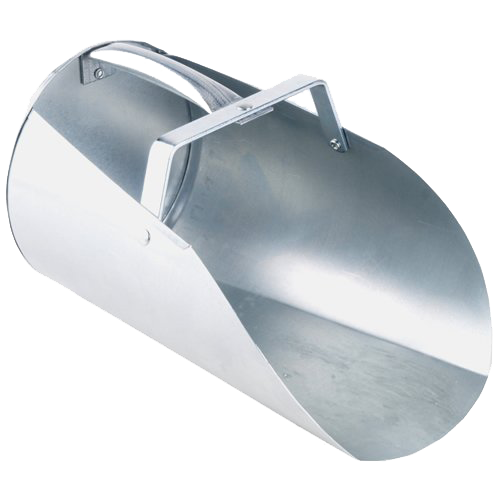
Scoop d'alimentation galvanisé de 6 litres
Heavy-gauge galvanized steel scoop with riveted handle. Perfect for scooping grain, but heavy-duty enough for pelleted hay and feeds. Flat end for easy storage. This is the scoop you want if you are looking for long wear and years of service. 7 inch long by 7.25 inch wide by 12.5 inch high, 6-quart capacity. Heavy-gauge galvanized steel Riveted handle Long wearing for years of service Flat end for easy storage 6-quart capacity
$17.50
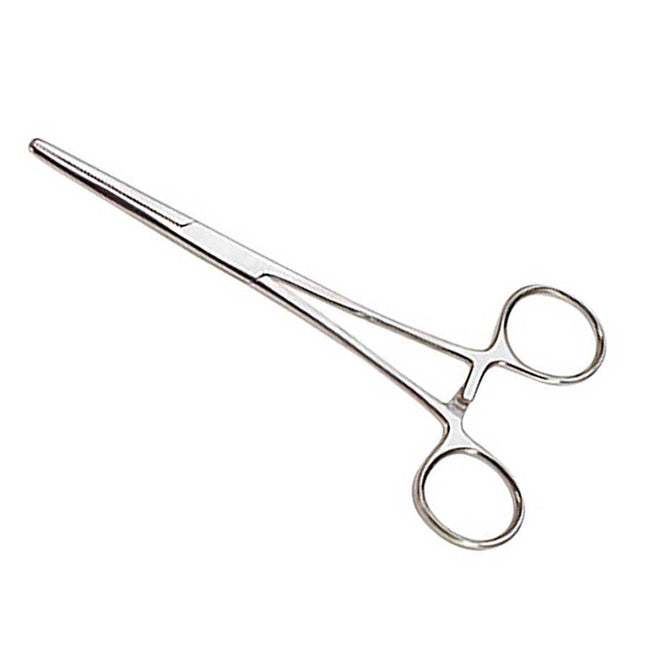
Pince hémostatique droite 6''
6 " Straight Forceps are a versatile tool in medical procedures, known for their precision and reliability. These forceps are commonly used in surgical settings for grasping, holding, and manipulating tissues with minimal trauma. The straight design allows for better visibility and control, making them suitable for a variety of surgical applications. Quality is critical when it comes to surgical instruments, and these forceps are typically made from high-grade stainless steel, offering durability, resistance to corrosion, and ease of sterilization. The design may feature serrated jaws for a secure grip, and the non-locking type requires manual pressure to hold tissues, which can be advantageous in delicate procedures. With advancements in medical technology, the use and quality of these forceps have evolved, ensuring they meet the rigorous standards of modern medicine. They are particularly useful in surgeries where delicate tissue manipulation is required, such as in laparotomy, intestinal, and gynecological surgeries. Their design allows for the careful handling of tissues, which is crucial in vascular surgery to prevent damage to blood vessels. In urology, these forceps are instrumental for procedures that involve delicate operations within confined spaces. The straight forceps are also favored in gastrointestinal surgeries, where they assist in the atraumatic handling of bowel tissues, as noted in the use of Babcock forceps. The quality and functionality of these forceps make them indispensable tools in the operating room, reflecting the advancements in surgical techniques and instrument design. Straight forceps offer several advantages over their curved counterparts, particularly in terms of visibility and accessibility. They are designed for use in open surgical sites where they can easily reach and clamp blood vessels and tissues. The straight design provides a clear line of sight and control, which is essential during precise surgical procedures. Additionally, straight forceps are beneficial for clamping larger vessels and tissues that are easily accessible, as they do not require the additional maneuvering that curved forceps might need in confined spaces. However, curved forceps have their own advantages, such as providing better access and control in deep or narrow body cavities. Ultimately, the choice between straight and curved forceps depends on the specific requirements of the surgical procedure and the anatomy of the area being operated on Made out of Stainless Steel these artery forceps with a locking mechanism are designed to grasp and hold an artery or surrounding tissue.
$8.99
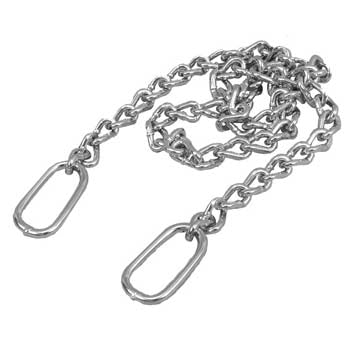
60˝ Chaîne OB
The 60-inch obstetrical (OB) chain is a crucial tool in veterinary medicine, particularly in the field of bovine obstetrics. It is designed to aid in the delivery of calves, providing a good grip without causing injury to the calf or cow during a difficult calving process. The OB chain is often preferred over rope because it is more sanitary and less likely to slip off during use. When selecting an OB chain, it is important to consider the material for durability and ease of cleaning. Premium-quality nickel-plated OB chains are recommended for their reliable performance and long-lasting durability. In practice, using two 30-inch chains—one on either leg—can be more practical than a single 60-inch chain. Proper placement is critical: a chain loop should be placed around the leg just above the fetlock, with a half-hitch just above the hoof to spread the tension and avoid injury. After use, the chains should be thoroughly cleaned and disinfected to maintain sanitation. The use of OB chains is a testament to the advancements in veterinary practices that ensure the safety and health of livestock during the birthing process Strong! Tested to withstand a minimum of 1,200 lbs. of pull.
$14.50

